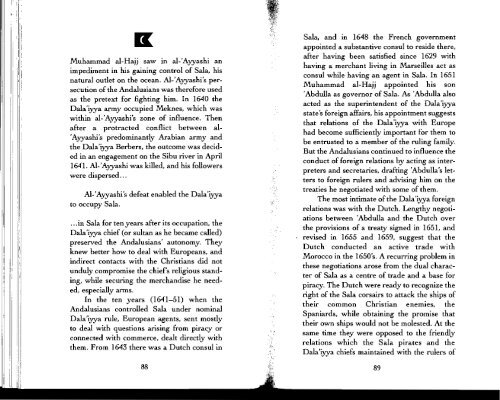Create successful ePaper yourself
Turn your PDF publications into a flip-book with our unique Google optimized e-Paper software.
K<br />
Muhammad al-Hajj saw in al-'Ayyashi an<br />
impediment in his gaining control of Sala, his<br />
natural outlet on the ocean. AVAyyashi's persecution<br />
ofthe Andalusians was therefore used<br />
as the pretext for fighting him. In 1640 the<br />
Dala'iyya army occupied Meknes, which was<br />
within al-'Ayyashi's zone of influence. Then<br />
after a protracted conflict between al<br />
'Ayyashi's predominantly Arabian army and<br />
the Dala'i;yya Berbers, the outcome was decided<br />
in an engagement on the Sibu river in April<br />
1641. Al-'Ayyashi was killed, and his followers<br />
were dispersed...<br />
Al-' Ayyashi's defeat enabled the Dala'iyya<br />
to occupy Sala.<br />
...in Sala for tenyears after its occupation, the<br />
Dala'iyya chief (or sultan as he became called)<br />
preserved the And.alusians' autonomy. They<br />
knew better how to deal with Europeans, and<br />
indirect contacts with the Christians did not<br />
unduly compromise the chief's religious standing,<br />
while securing the merchandise he needed,<br />
especially arms.<br />
In the ten years (1641-51) when the<br />
Andalusians controlled Sala under nominal<br />
Dala'iyya rule, European agents, sent mostly<br />
to deal with questions arising from piracy or<br />
connected with commerce, dealt directly with<br />
them. From 1643 there was a Dutch consul in<br />
88<br />
Sala. and in 1648 the French government<br />
appointed a substantive consul to reside there,<br />
after having been satisfied since 1629 with<br />
having a merchant living in Marseilles act as<br />
consul while having an agent in Sala. In 1651<br />
Muhammad aI-Hajj appointed his son<br />
'Abdulla as governor of Sala. As 'Abdulla also<br />
acted as the superintendent of the Dala'iyya<br />
state's foreign affairs, his appointment suggests<br />
that relations of the Dala'iyya with Europe<br />
had become sufficiently important for them to<br />
be entrusted to a member of the ruling<br />
But the Andalusians continued to influence the<br />
conduct offoreign relations by acting as interpreters<br />
and secretaries, drafting 'Abdulla's letters<br />
to foreign rulers and advising him on the<br />
treaties he negotiated with some of them.<br />
The most intimate ofthe Dala'iyya foreign<br />
relations was with the Dutch. Lengthy negotiations<br />
between 'Abdulla and the Dutch over<br />
the provisions of a treaty signed in 1651, and<br />
revised in 1655 and 1659, suggest that the<br />
Dutch conducted an active trade with<br />
Morocco in the 1650's. A recurring problem in<br />
these negotiations arose from the dual character<br />
of Sala as a centre of trade and a base for<br />
piracy. The Dutch were ready to recognize the<br />
right of the Sala corsairs to attack the ships of<br />
their common Christian enemies. the<br />
Spaniards, while obtaining the promise that<br />
their own ships would not be molested. At the<br />
same time they were opposed to the friendly<br />
relations which the Sala pirates and the<br />
Dala'iyya chiefs maintained with the rulers of<br />
89


